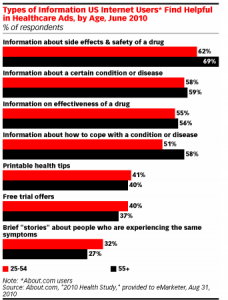Online health information. Definitely not the most intriguing or sexy topic for many readers but I find it interesting for two reasons. We currently work with a client that this information directly pertains to, and as I’ve mentioned in previous health-related posts, I grew up in a family of doctors so health information has always captured my attention. But what about online health information? What caught my eye was a recent eMarketer piece, Marketing to Seniors with Online Health Information, and studies conducted over the past two years that found information critical to marketers promoting health information online.
Internet Users and Health Information In General
Let’s talk about some basics. In 2006, the Pew Internet & American Life Project conducted a study on Americans seeking online health information. At that time, over 10 million Americans were searching the Internet daily for health information. As one might expect, women made up a higher percentage of these users but by less than a 10% difference. Of those searching for health information, 72% visited two or more sites during their session and 66% began their quest on a search engine. Nearly 50% of those searching for information were searching for someone other than themselves and 55% say the information they found changed their approach to maintaining their own health or someone they help take care of. These are significant numbers that have most likely increased over the past five years. But what about seniors specifically? According to The Nielsen Company, in the last five years the number of seniors actively using the Internet has increased to 17 million. They also spend over 58 hours per month online, nearly two hours per day, and are involved in many of the same activities as other age groups: email, sharing photos, social networking, searching for financial information, and travel, to name a few.
Seniors’ Health Info Needs
In 2009, Mediamark Research & Intelligence found that seniors age 65 and older were the least likely to seek out health information online (except for 18-24 year olds). However, Boomers aged 55-64 were the most likely to search for online health information. As these Boomers age, we can expect to see a sharp shift in the number of seniors searching for health information online and marketers should be prepared. When we talk about seniors, we have to consider a population that is likely to have some chronic medical condition that probably requires medication. This information, as we’ve seen over the past ten years in particular, has been translated into increased, detailed advertising about pharmaceutical drug options, side effects, and benefits. About.com found that users 55 and older were most concerned with drug side effects and safety, in addition to general information about the disease the drugs may be helping treat.
Who Can You Trust?
A problem that has nearly always pervaded communications in the healthcare industry is trust. Materials from pharmaceutical companies stand out as slick and glossy and not trustworthy, state health departments used to always have trustworthy but drab and boring educational materials. People could tell the difference a mile away. Materials produced by pharmaceutical companies ranked at the bottom only ahead of financial services in terms of trustworthiness according to adults surveyed in 2009 by AdWeek Media and Harris Poll. While some of these materials may have moved online, the trust issue still remains especially with an increase in social media, according to a survey by Capstrat and Public Policy Polling. Seniors over 65 distrust social media and do not consider online forums reliable. Even Boomers, who are heavier online users in general, do not find health information from online forums reliable. However, this has not dissuaded health-related businesses and organizations from adding social media to their traditional media. Touchstone Health, a Medicare Advantage health plan in New York, is communicating with seniors using a variety of social media including Twitter, Facebook, YouTube and blogs.
Things to Consider
As more Boomers reach the 65+-age bracket, it will be important to continue to consider online web presence, particularly if our organizations or businesses are health focused. The new seniors are more web savvy than their predecessors and expect more from health websites. They will be looking for information that is trustworthy, clear and concise, and timely. Clear messages and clean sites will be the key to reaching this expanding target audience segment.
Related articles
- Old people catching up to youth when it comes to Internet usage (techvibes.com)
- Why More Health Experts Are Embracing the Social Web (mashable.com)



